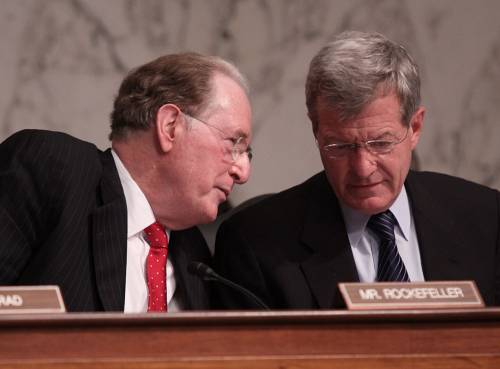Senate Panel Shoots Down Public Option, Twice
Despite growing public support for a government-backed insurance option to compete with private insurers, a Senate panel on Tuesday twice beat back Democratic efforts to create such a plan.
Jul 31, 2020293.4K Shares3.9M Views
Sens. Jay Rockefeller (D-W.Va.) and Max Baucus (D-Mont.) at Tuesday's Finance Committee hearing (WDCpix)
Despite growing public supportfor a government-backed insurance optionto compete with private insurers, a Senate panel on Tuesday twice beat back Democratic efforts to create such a plan.
One by one, public option proposals sponsored by Sens. Jay Rockefeller (D-W.V.) and Charles Schumer (D-N.Y.) were shot down by the Senate Finance Committee, with Republicans warning of a government takeover of health care, and at least one powerful Democrat arguing that the concept is simply impractical because it doesn’t have the support to pass the full chamber.
Illustration by: Matt Mahurin
“My first job is to get this bill across the finish line,” said Finance Chairman Max Baucus (D-Mont.). “I don’t see how the public option gets 60 votes on the floor.”
Baucus voted against both amendments.
Together, the votes mark a high-profile, if expected, victory for the insurance industry, which has argued that the creation of a government-backed plan would erode private markets at the expense of patient choice. It also represents a set-back for many Democrats and patient advocates, who contend that only a robust, not-for-profit insurance option will have the leverage to keep consumer costs low — and private insurers honest. A bill passed by the Senate Health, Education, Labor and Pensions Committee — and another moving through the House — includes such a plan.
President Obama, who supports the public plan, has tried repeatedly to downplay the plan’s significance, arguing that it represents just one sliver of the much larger health reform pie. But few have listened, and the issue has evolved into one of the most hot-button topics of the year’s health reform debate.
Under the Rockefeller amendment, the government would create an insurance option to compete with private plans on a newly proposed insurance marketplace, called an exchange. Rates would mirror those of Medicare for two years after the plan launched. Afterwards, plan administrators would negotiate new rates with providers, just as private insurers do now. The Congressional Budget Office estimates that the proposal would save $50 billion over 10 years.
Rockefeller said his proposal would act as “a counterweight” to “rapacious” private insurers, who routinuely put profits before care concerns.
The Schumer amendment was similar but wouldn’t have tied rates to Medicare.
Supporters were quick to point out that, under both proposals, no provider would have been required to accept the public plan, and no patient would have been forced to get coverage through it. “The people who don’t like it can dump it,” Rockefeller said. “That’s called free choice.”
Sponsors also emphasized that, after the initial federal funding, their plans would be paid by patient premiums, not government subsidies. “It’s going to be independent, self-financing and self-sustaining,” Schumer said.
Adding some weight to their push, a New York Times/CBS pollconducted this month found that 65 percent of Americans support “the government offering everyone a government-administered health insurance plan like Medicare that would compete with private insurance plans.”
But the outcome of Tuesday’s votes was largely decided before the debate began. Indeed, Senate Republicans have been clear that they won’t support support a health reform bill that includes the public option.
Sen. Charles Grassley (Iowa), the senior Republican on the finance panel, conceded that the current system has “shortcomings.” But Congress shouldn’t use those failures, he said, as reason to undermine the innovation that results when private markets compete against one another. The creation of a public option, Grassley said, represents “a slow walk toward government-controlled, single-payer health care.”
Yet a 2007 surveyof insurance market concentration indicates that the private insurance market is headed that way already. Conducted by the American Medical Association, the nation’s largest physicians lobby, that survey found that, in most states, the top two insurers consume a large majority of the marketplace. In Maine, for example, the top two insurers control 88 percent of the insurance market. In both Montana and Wyoming, the number is 85 percent. Florida, where the top two insurers represent 45 percent of the market, has the lowest market concentration, AMA found.
Sen. Bill Nelson (D-Fla.) said those figures are indication that the private model is, by itself, moving toward the single-payer model. “That doesn’t sound like a lot of competition to me,” said Nelson, who opposed the Rockefeller amendment but voted in favor of Schumer’s proposal.
The Rockefeller amendment fell 8 to 15, while Schumer’s proposal failed 10 to 13. Aside from Baucus, Democratic Sens. Blanche Lincoln (Ark.) and Kent Conrad (N.D.) also voted against both proposals. Conrad has been the leading proponent of private, health care
Still, public option — hopeful that the prominent debate will lend the public option some momentum — are also vowing to bring it up again as the health reform debate rolls on.
“This isn’t the first word on the public option,” Schumer said, “and it won’t be the last.”

Rhyley Carney
Reviewer
Latest Articles
Popular Articles

